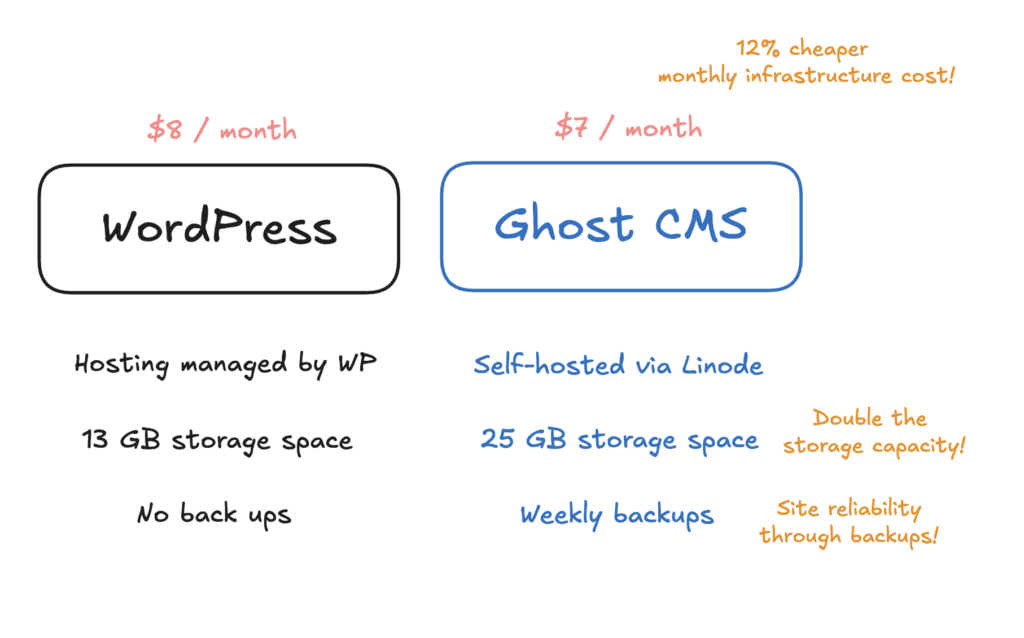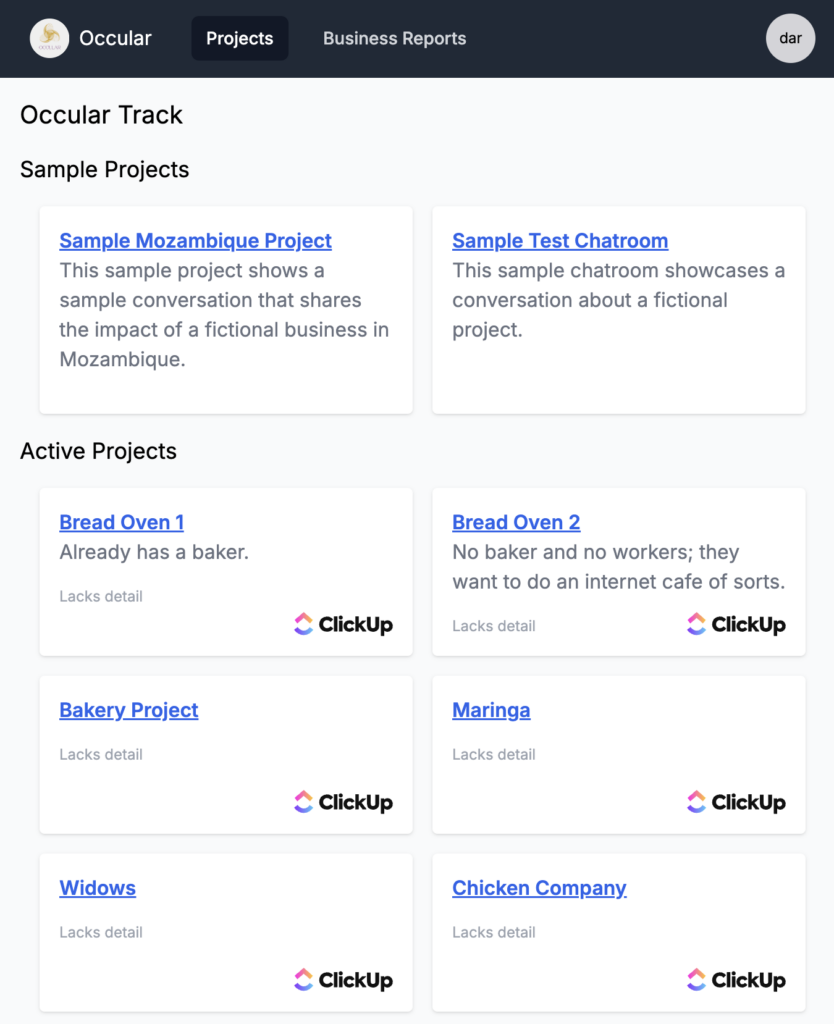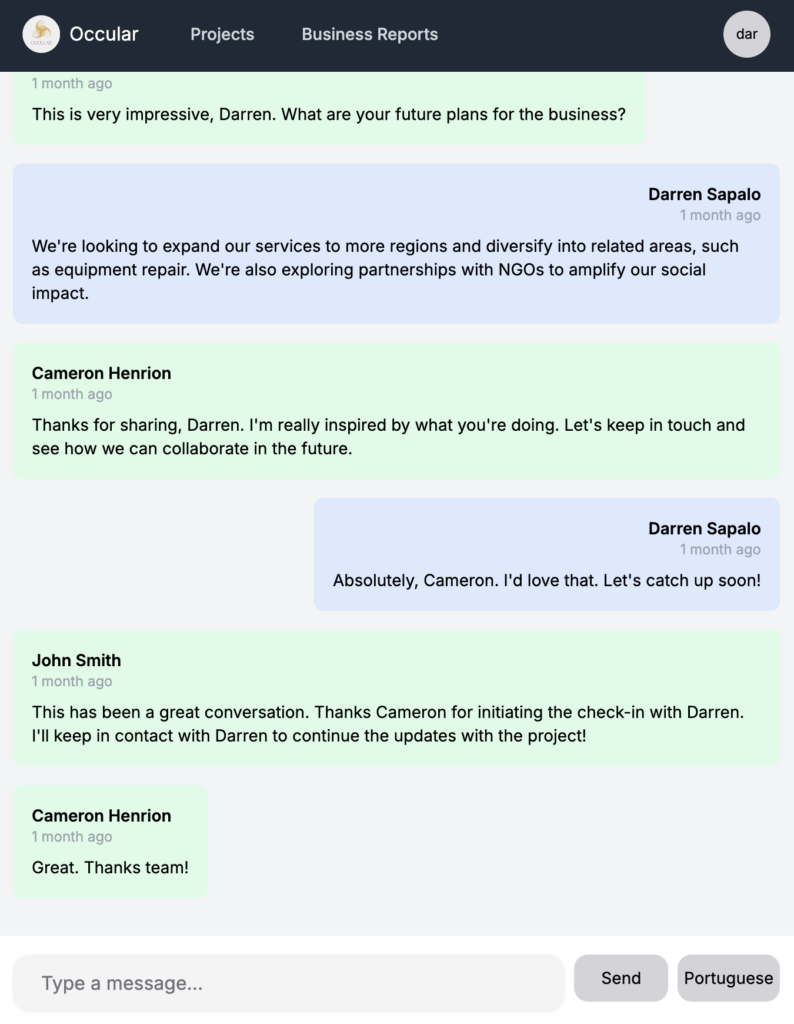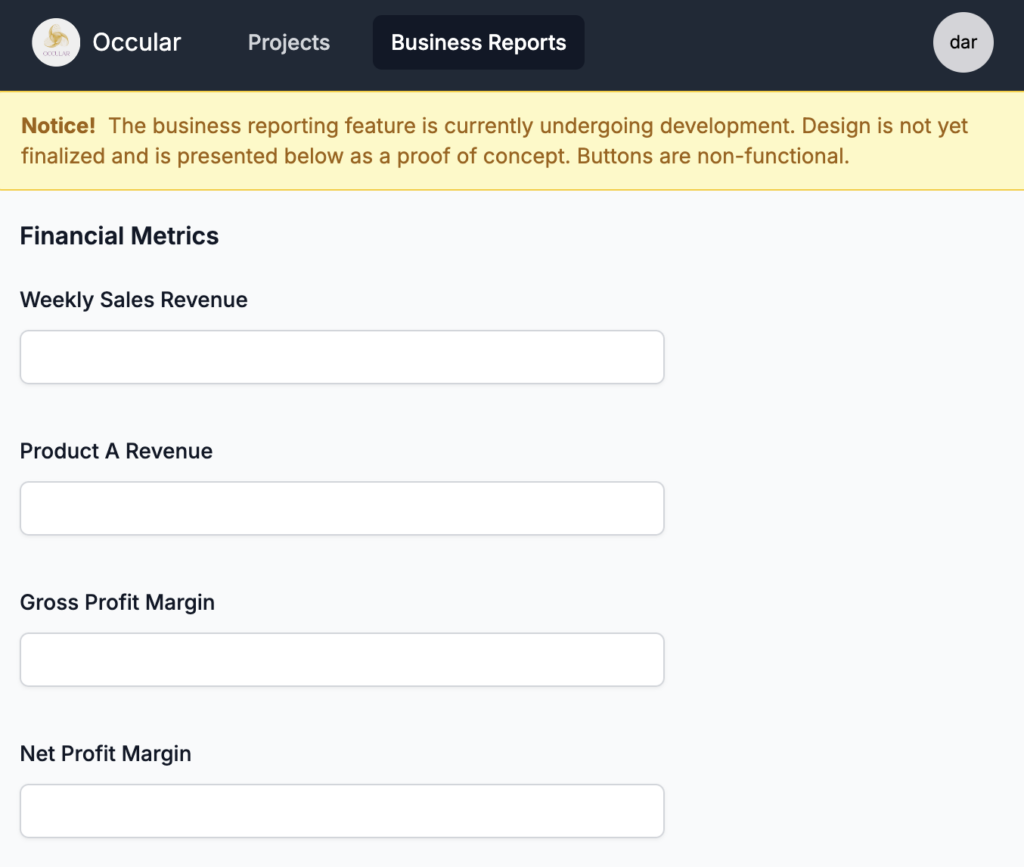Key highlight: Effective data management integrated with internal collaboration tools can identify and measure operational and data bottlenecks while precisely identifying where businesses can focus their resources and energy to scale their operations.
Introduction
Occular.co has two primary business functions. First, its fractional CFO services business is Occular.co which services North America-based small to medium enterprises. Second, Occular Institute is its micro angel-investing and economic innovation platform, offering investment sizes ranging from $500 to $2000.
This ecosystem involves various individuals and organizations with whom they engage with on their community website, sharing progress updates on the performance of their projects and investments, providing educational material on business and financing for entrepreneurs, and highlighting the rockstar partners and business owners driving social impact in the Africa region including but not limited to Ethiopia, Mozambique, Kenya.
Occular is in the business of designing economic systems, building networks, and establishing partnerships in Africa and other emerging countries and regions to create lasting community change. One primary way of creating that lasting community change is by supporting early-stage businesses to achieve profitability and sustainability.
- In their angel investing arm (Occular Institute), their goal is to operate at least 100 concurrent investment projects in Africa in a year. They are currently in the experimental stage and are identifying key risks and challenges in their existing portfolio of 40+ projects and investments.
- In their community engagement arm (Occular community), their goal is to reach more entrepreneurs in the designated regions established with Innovation Centers and Hubs, to connect with potential partners, and connect with investors and philanthropists based in North America.
My involvement with this project spans between June 2024 to August 2024 and has two primary focuses: technology strategy and operations.
Challenge
Lean team: Occular runs a small team (less than 7) which means that efficiently designed systems are critical to monitor our project investments as well as effectively-measured systems that help us monitor data about our users (external: entrepreneurs, investors, new partners; internal: teammates, existing partners), supporting both market research and operations research.
Limited availability: the founder, Cameron Henrion, has been prioritizing the fractional CFO services as that is what finances the investments used by the Institute. Some parts of the team are currently part-time and do not have dedicated hours to focus on the project.
Language barriers: Our partners based in the innovation centers and hubs in Africa use various languages and dialects. In Mozambique, for example, most citizens speak Portuguese and Makhuwa. Portuguese is spoken by around 50% of the national population, primarily in urban areas, as a first or second language and it serves as a lingua franca between younger Mozambicans with access to formal education.
Language barriers are a great difficulty when it comes to upskilling and educating ambitious entrepreneurs in the region, as well as capturing rich, qualitative stories and case studies to understand the performance of the projects and investments.
Fragmented data collection and storage policy: Information about the projects and investments were collected in different digital repositories that introduced friction when onboarding new teammates. Furthermore, our operations teammates communicate with our existing partners directly through chat applications such as Whatsapp, which has restrictions when it comes to user interaction design with users on its platform, and limitations on data collection or event-listening to group chat messages.
Limited data sharing: Whether it is coordinating with an interested entrepreneur applying for an investment or it is collaborating with our key partners, the private peer-to-peer conversations limits the availability of data shared across the team, and increases cost in data cleaning when integrating data from different sources. This limits collaboration and introduces data processing bottlenecks.
What we did
Given the constraints of limited availability with key operations teammates, I independently prioritized external, black-box website quality audits on the three different websites (Occular.co, Occular.community, Occular.institute) to both rapidly absorb business context and understand the status of their technology stack. This helped me understand the team’s existing projects and investment updates, as well as empathize with users on digital touch points they interact with.
(Tech) Tech stack modernization: I found that the team had been using WordPress as their content management platform for their three websites. Although WordPress has a lot of plugins and capabilities, this increases the usage and maintenance complexity of the content management system.
Instead of paying for a standard WordPress subscription on the WP platform, I transitioned the website to a self-hosted Ghost CMS: a modern, open-source platform optimized for performance and scalability and offering a streamlined content management experience.

(Tech) Introducing back-ups to increase site-reliability: The initial audit of Occular.co’s WordPress site revealed critical areas needing attention: lack of regular backups. In response to this problem and in conjunction with the self-hosted Linode instance, I was able to configure a weekly-backup system that can ensure availability to our website portal and secure business continuity.
(Tech) Developing Occular Track- a data collection/collaboration tool for internal teammates: We needed to make sure that our communications platform with our counterparts in Africa has a superior user experience that balances the types of data that we collect from our partners. Given the limitations in the Whatsapp platform, I assessed and planned a simple system design for chat application for our operations teammates based in the US and our Africa-based key partners and collaborators in our innovation centers and hubs.
Our hope is that an effectively designed collaboration tool would open up the opportunity for greater data availability for internal teammates responsible for generating reports for each project, and drive transparency to investors and across entrepreneurs within the Occular ecosystem.

I decided a simple two-type design: project chat conversations (chat app) and business reports (forms).
The chat app is like any other chat application, with support for multiple users in a single chat conversation. Each chat conversation represents one context of a single project or investment. One user can be involved in multiple kinds of conversations/projects. Aside from the basic chat capabilities, the application is capable of translating between English and Portuguese to address language barrier concerns.

The business reports use a simple design of just forms asking information about one specific project or investment. This can involve collecting information about sales revenue, costs, or inventory availability and such. Each of these forms are to be tailored depending on the stage and type of the business.

The design for both the chat app and the business reports was intentionally simple and straightforward to minimize complexity on the site. We hope that our target users based in Africa benefit from this increased simplicity and familiarity to common experience design.
We also configured a space in ClickUp, a CRM/project management tool, to organize all the data about the different projects into a single location available to all existing teammates.
This system was built using Nuxt.js for its Single Page Application development, Auth0 for IAM, Vercel for CI/CD and deployment, and GitHub as a code repository, Google Cloud Platform was used with the Google Sheets integration, storing user, conversations, and message data in a Google Sheet.
The first iteration of the software was planned to be built in three weeks. The actual build time spanned between June 4 to June 25. Succeeding iterations involved incremental improvements on user experience improvements as well as GA4 tracking.
(Marketing) Fine-tuning of analytics aligned with business objectives: I found that the WordPress site had its freemium Jetpack analytics configured. However, that service has its own limitations and some premium analytics capabilities are locked behind a paywall. In response, I integrated Google Analytics 4 (GA4) and fine-tuned its audience and events tracking to provide Occular.co with deeper, actionable insights into their audience’s interactions.
We defined clear audience types such as entrepreneurs based in the African continent, and investors from North America, we are able to monitor our marketing campaigns such that it drives up our engagement and conversion rates.
Results
Tech Modernization: From an original monthly infrastructure cost of $8.00 per month on a standard WordPress plan, the new modern stack had a monthly infrastructure cost $7.00 (12% cheaper) with nearly double the storage capability of 25GB (92% more storage) while also including regular, weekly backups!
Occular Track: In three weeks, we designed, built, and deployed the Occular Track application enabling broadly data accessibility to authorized users within the team, both through Occular Track as well as ClickUp project management. This operational infrastructure enables Occular to relieve bottlenecks in its operations.
Marketing analytics: The introduction of a fine-tuned Google Analytics 4 enables the business to understand its user base carefully, thus amplifying the effectivity and learnings from marketing campaigns to reach more entrepreneurs and investors.
Ongoing Progress
Currently, the team is on the deployment phase for Occular Track, onboarding internal teammates into the system.
Building on the success of the initial project, our collaboration with Occular.co is progressing. We are now exploring innovative ways to enable stakeholder engagement in their mission through the Occular Institute. This initiative aims to provide entrepreneurs and investors with a clear lead page to capture their interest and involvement in the project. The goal is to create a seamless entry point for stakeholders, fostering a deeper connection with Occular.co’s vision and objectives.
References
- Fractional CFO services with Occular.co
- Occular Community
- Occular Institute
